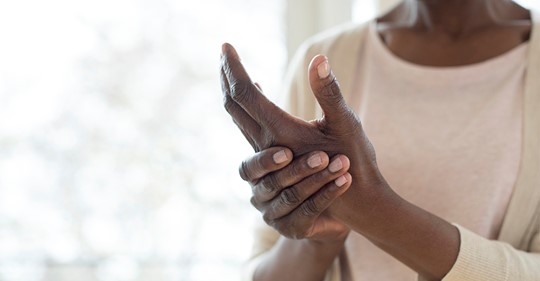
You likely know that certain chronic health conditions such as diabetes, heart disease and kidney ailments boost your risk of serious problems with COVID-19. But what if you have arthritis?
For the most part, you can breathe a sigh of relief, because rheumatic diseases in and of themselves don’t appear to increase your odds of contracting COVID-19, says Ellen M. Gravallese, M.D., chief of the division of rheumatology, inflammation and immunity at Brigham and Women’s Hospital, in Boston, and the president of the American College of Rheumatology.
But some underlying issues related to your condition, as well as certain medications you may take, may raise concerns, she cautions.
Over 54 million U.S. adults suffer from some form of arthritis, a category that includes osteoarthritis, rheumatoid arthritis and psoriatic arthriti — all of which damage joints in different ways.
Good news for those with osteoarthritis
The most common type, osteoarthritis, seems in the clear when it comes to the coronavirus. A few months ago, scientists were worried that people taking common arthritis medications known as nonsteroidal anti-inflammatory drugs (NSAIDs) — a category that includes aspirin, ibuprofen, Aleve and selective COX2 inhibitors like Celebrex and Vioxx — could have an elevated risk of contracting the disease. This was based on a theory that the increase of an enzyme in the lungs from the drugs might create a welcome mat for the virus.
But so far no patient studies have linked NSAID use with the disease caused by the novel coronavirus, according to the Centers for Disease Control and Prevention (CDC). Even though the theoretical concern about these drugs doesn’t seem to be playing out, if you can get relief from Tylenol or a nonprescription topical cream, you might want to switch or take NSAIDs at the lowest dose that helps, advises Lee Rubin, M.D., chief of the Total Joint Replacement Program at Yale Medicine.
Perhaps a bigger health issue with osteoarthritis right now is the way that self-isolating may affect your ability to exercise. Physical therapists like to say that “Motion is lotion” for those with joint issues. So if you’re more sedentary because you’ve been avoiding the gym or pool, this can aggravate your disease. Look for new, safe exercise alternatives, like an online fitness class or taking walks or bike rides around your neighborhood, Rubin suggests.
Save 25% when you join AARP and enroll in Automatic Renewal for first year. Get instant access to discounts, programs, services, and the information you need to benefit every area of your life.
Osteoarthritis patients may also be skipping corticosteroid injections that keep pain at bay. As doctors’ offices reopen around the country, talk with your physician about resuming your shots, since medical offices should be following CDC guidance on infection control. And if you had planned a joint replacement surgery, know that hospitals are restarting elective procedures. Yale New Haven, for one, is scheduling outpatient hip and knee replacements for healthy patients under age 65 who can be discharged directly to their home. If that goes well, surgery for older patients and those with significant comorbidities should follow in the next few months, Rubin says.
Risks seen with rheumatoid arthritis
People with autoimmune forms of arthritis, including rheumatoid arthritis and psoriatic arthritis, face more significant concerns. The CDC specifically lists being on immunocompromising drugs as a factor that elevates your risk of COVID-19 complications. The reason: The drugs make it harder for your body to mobilize immune cells to fight the disease. This is why both the American College of Rheumatology (ACR) and the National Psoriasis Foundation recommend that if you are exposed to or develop COVID-19, you should temporarily stop immunosuppressant pharmaceuticals like cyclosporine, CellCept, Enbrel or Humira.
Doctors do not recommend stopping these drugs if you don’t have any known exposure to the coronavirus. Uncontrolled inflammation from rheumatoid arthritis can make you susceptible to other health problems, Gravallese points out.
No matter what type of arthritis you have, it’s crucial that you stay in touch with your physician. You may be able to see your doctor via telemedicine. If you’re using a telehealth platform, video is generally preferable to just a phone call, says Lynn Ludmer, M.D., medical director of rheumatology at Mercy Medical Center in Baltimore. “Using your camera, I can look at the joints that are bothering you and watch your range of motion,” she says.
But if you are able to go to your doctor’s office, especially if your disease is flaring up or your medicine is causing adverse effects, you should do so. According to the ACR, the benefits of an immediate face-to-face assessment in those cases almost certainly outweigh any risk.






